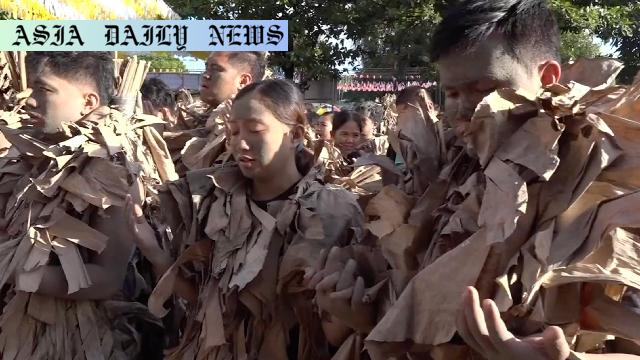Mud Festival: Devotees in the Philippines cover themselves in mud, pray for world peace, and honor a World War II legacy.
Devotees cover themselves in mud and pray for global peace in an annual Philippines festival.
The tradition traces back to an event during World War II, believed to have saved villagers from harm.
More than 2,000 participants gathered, reflecting on modern-day conflicts and emphasizing the need for peace.

A Unique Tradition Rooted in History
The Mud Festival in the Philippines is not just a spectacle; it is a poignant reminder of resilience and hope that stems from history. Dating back to 1944 during World War II, this festival has deep roots in local folklore. According to residents of a village in northern Luzon Island, Japanese Imperial troops planned to execute villagers. However, a sudden and heavy rainstorm disrupted their plans, leading the villagers to believe that the downpour was a divine intervention sent by Saint John the Baptist.
Each year, before dawn, participants gather in the rice fields of Luzon Island to immerse themselves in mud. They believe it carries the dual purpose of warding off bad luck and symbolically cleansing the soul. With banana leaves lining their bodies, the devotees walk to a Catholic church at sunrise to offer prayers for global peace. The tradition has endured generational shifts, passing on lessons of empathy, unity, and gratitude amidst adversity.
A Celebration for Global Peace
This year, over 2,000 people attended the festival, showcasing its global relevance despite being deeply rooted in a local narrative. The event serves as a platform to bring attention to current world issues. One participant shared that they prayed for peace in war-torn regions like Ukraine and the Middle East, reiterating how interconnected the world remains. The universal message of striving for harmony transcends geographical boundaries, proving that even a localized tradition can resonate globally in its pursuit of peace.
The 38-year-old granddaughter of a World War II survivor attended the festival and emphasized the importance of keeping the past alive through such traditions. She highlighted the camaraderie and remembrance brought forth by this event, particularly in a time when world conflicts persist. Her reflection underlined how the festival encapsulates lessons from the past and inspires hope for the future.
The Power of Resilience in a Changing World
The festival not only connects people but also fosters a sense of introspection. Participants use this opportunity to reflect on humanity’s shared struggles and collective resilience. The act of smearing mud, dressing in banana leaves, and walking in solidarity is powerful in its symbolism—it brings attention to the beauty of cultural rituals in preserving values and history.
As modern challenges persist, the humble Mud Festival acts as a call to remember lessons from history and advocate for global unity. It provides a platform for expressing personal and collective prayers, ensuring these traditions continue to unite communities and leave impactful legacies for years to come.



Commentary
The Importance of Preserving Cultural Traditions
The Mud Festival in the Philippines highlights the powerful role that cultural traditions play in connecting communities to their historical roots while addressing modern-day challenges. This unique ritual is far more than a simple gathering; it serves as a meaningful expression of remembrance and resilience that honors a critical moment in history. The rain that saved the villagers decades ago has become a central symbol of hope, a testament to the power of faith, and an enduring legacy for this community.
The Universal Relevance of the Mud Festival
What makes the Mud Festival stand out is its ability to link the past to the present, blending historical memory with contemporary relevance. While it commemorates the struggles faced during World War II, it also provides a reflective space for participants to think about ongoing global conflicts and the imperative need for peace. Although the tradition originates in the Philippines, it serves as a call to action for people everywhere, reminding them of the importance of unity and compassion, especially in turbulent times.
A Lesson in Resilience and Hope
This festival is also a reminder that out of darkness, light can emerge. The story of the villagers who found salvation during a storm teaches us that hope and resilience are key to overcoming life’s challenges. Such traditions remind society of the strength of shared community experiences and the human capacity for perseverance. Festivals like these are not merely rituals but are invaluable in ensuring that historical and moral lessons persist, guiding both present and future generations.